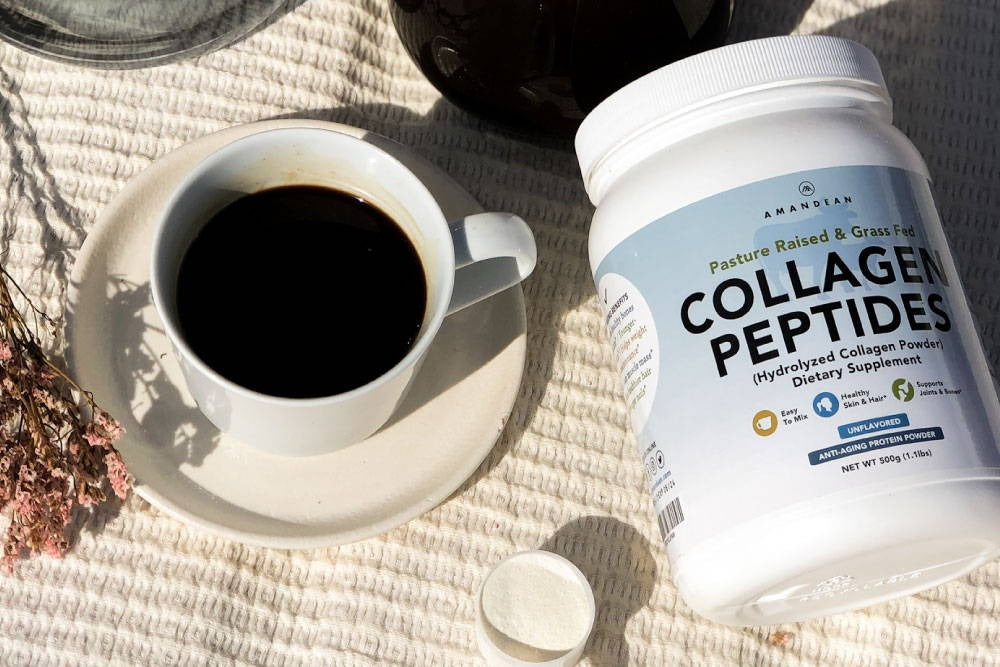Your Cart is Empty

February 27, 2024 6 min read
Take our quiz and find which supplements your body is craving.

In a perfect world, after going through menopause, women would be able to kick back, relax, and wave the white flag because the war is over. Unfortunately, for many, the phase that follows can be just as challenging, if not even more complex than the menopausal transition itself. Postmenopause represents the aftermath of significant hormonal changes that, without exception, affect every single aspect of female health.
One of the most prominent and life-altering conditions in this life stage is postmenopausal osteoporosis, a silent yet powerful enemy that seriously compromises bone health. Osteoporosis targets bone strength and density, jeopardizing bone structure and increasing the risk of serious injuries.
In this guide, we will take a deep dive into the mechanisms and natural management solutions for postmenopausal osteoporosis, but let’s start with a quick overview of postmenopause itself.
After 12 consecutive months without a period, which is considered menopause, a person who menstruates officially enters postmenopause. This period marks the end of the reproductive stage, and with the menstrual period, ovulation no longer occurs, either. It is important to mention all three stages to fully grasp menopause as a multilayered process: perimenopause, menopause, and postmenopause.
Perimenopause marks the time leading up to menopause, or loss of your period, which can start as early as the age of 35. While women are still ovulating and getting their period during this time, hormonal changes may result in irregular periods or even absent periods that return after a few months. However, a consecutive period of 12 months without a period is undoubtedly the start of menopause, when period-inducing hormones completely cease.[1]

Postmenopause, simply put, encompasses the years after menopause, but not every woman will experience it the same way. Most women enter the postmenopausal stage of their lives around the age of 51; however, it can start as early as the age of 45. [2] While some women experience unpleasant symptoms such as hot flashes, water retention, and mood swings only during menopause, others are able to manage these symptoms long after the menopausal transition.
However, the challenges don’t stop at night sweats, insomnia, skin dryness, incontinence, and anxiety. Postmenopause carries a high risk for other serious health issues, including cardiovascular conditions and osteoporosis.[1]
A decline in important hormones, especially estrogen, can lead to the following problems in postmenopausal women[2]:
Osteoporosis represents a bone disease that seriously affects bone mass and mineral density, as well as the structure and strength of the bones. Due to these significant changes in bone composition, osteoporosis carries a high risk for fractures.[3]
Unlike many other health issues and conditions experienced in postmenopause, osteoporosis usually doesn’t have any visible, clear symptoms that could yield an early diagnosis. In many cases, it is diagnosed only after the fracture has already occurred, and it remains one of the main causes of bone fractures in aging men and women.[3]
Other than the aging factor, why are postmenopausal women at high risk of developing osteoporosis? As we mentioned, reduced estrogen levels impact bone density through multiple mechanisms. With an increase in bone resorption and, consequently, a decrease in bone formation, low estrogen levels lead to rapid bone loss in menopause, which continues in the postmenopausal stage.

Postmenopausal and age-related bone loss combined create the perfect environment for the development of degenerative conditions such as osteoporosis.[4]
In addition to inevitable factors such as estrogen decrease and aging, poor lifestyle choices could contribute to osteoporosis development and increase fracture risk[3]:
Let’s explore all-natural supplements that can improve bone health during postmenopause and aid in osteoporosis management or lower the chances of developing this condition after menopause.

There isn’t much surprise here, as collagen is the ultimate structural protein and the most abundant protein in the human body. It plays a vital role in bone mineralization, which provides structural stability. Collagen is also very much present in the process of bone development, aiding in bone growth, which is especially important after an injury or a fracture.[5]
A recent study on the role of collagen peptides in osteoporosis management [6] confirmed that adding a quality collagen source to your diet may boost bone mineral density. Since a clean collagen supplement has no side effects, it can safely be employed in a long-term osteoporosis management strategy.
Supplementing with high-quality hydrolyzed collagen may increase the overall bone density, alleviating the negative effects of postmenopausal hormonal changes.
This valuable mineral is also known as the bone mineral, as approximately 99% of the calcium in the body can be found in teeth and bones. Calcium is the irreplaceable key factor in bone formation, and its deficiency can lead to low bone mineral density and ultimately - osteoporosis.[7]
In addition to a balanced diet, including dairy, green leafy vegetables, sardines, grains, pasta, and bread, calcium intake can also be increased through supplementation - especially in cases of dietary restrictions such as lactose intolerance.

That being said, getting enough calcium through an optimized diet is not enough, as calcium absorption depends on vitamin D. Vitamin D acts as a secosteroid hormone, aiding in calcium absorption, as well as the process of bone mineralization. Vitamin D deficiency may lead to osteoporosis, osteomalacia, fractures, and even rickets in children.[8]
In addition to daily sun exposure and diet optimization, getting enough vitamin D, especially during winter months, can be much easier with the right supplementation. Vitamin D3 and K2 represent an ideal, crucial duo in calcium metabolism.[9]

A study highlighting the role of magnesium in bone health [10] suggests that magnesium and calcium together can increase average bone density. Magnesium supplementation has also been found to increase hip bone and lumbar spinal bone mineral content in some subjects due to its effect on overall bone mineralization and development.
Changes that come with aging aren’t something that can be controlled or avoided. However, the philosophy of graceful aging allows us to come to terms with maturity by embracing both its beauties and flaws. One of the perks of being in tune with yourself and the different phases your body goes through is understanding these processes and learning how to tip the scales in your favor. With subtle yet significant lifestyle changes, a balanced diet, and a stack of cherry-picked powerful supplements, you can face anything postmenopause throws your way.

April 08, 2025 7 min read
Discover the powerful trio for graceful aging—Vitamin D3+K2 and Omega-3 fatty acids. This dynamic combination supports bone strength, heart health, immune function, and reduces inflammation, helping you maintain vitality and well-being as you age.

March 20, 2025 8 min read
Discover the benefits of creatine for women with Amandean’s Creatine HCI. Improve strength, energy, recovery, and cognitive function with this high-absorption formula. Its advanced HCl form ensures easy digestion and no bloating, providing all the benefits without the drawbacks. Elevate your fitness journey and overall wellness with a supplement designed for women’s unique needs.

March 03, 2025 7 min read
Discover how Bryan Johnson, a tech entrepreneur turned biohacker, uses cutting-edge science and personalized genetic testing to revolutionize health and longevity. Learn how biohacking, from diet to mental health practices, can help you live longer and healthier, with practical strategies to optimize your well-being. Find out more about genetic testing, and ways to implement results into your wellness routine.